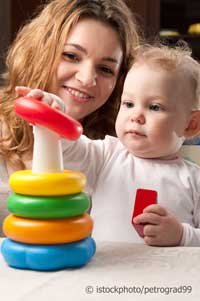Our Approach
Playful Bee's mission is to help parents become the best "first teacher" to their 0-3 year olds, inspiring and nurturing their early learning starting at birth. Playful Bee provides parents with an early education curriculum that is effective and based on evidence-based research, not to mention is fun, smart, and easy-to-use. All of our work is focused on the following core values and approaches to learning:
We encourage play-based learning. Young children are like sponges! They learn best from multi-sensory experiences and hands-on exploration of their surroundings. For children ages three and under, early childhood development and education starts with play-based learning, which helps children understand the world around them, develop creative thinking and problem-solving skills, and build initiative and self-control abilities.
We support child-centered learning. Young children are naturally curious; they learn best when they are allowed to explore what they are naturally interested in instead of through a fixed curriculum. As a parent, observe your child's likes and dislikes as well as his strengths and weaknesses. Let him explore toys and play activities on his own to fire up his imagination, initiative, and problem-solving skills. But always stay nearby to offer support and encouragement when needed.
We reinforce organic, contextual learning. Young children are observant of daily life! They learn best through every day events and routines by experiencing the natural flow of social living. They develop an understanding of the world based on their own experiences and points of view. As a parent, take advantage of every opportunity that pops up during your day to point out new things and discuss the familiar ones. As your child grows, you'll be amazed at how much he will learn from his daily routine with your guidance.
We say “yes" to simple toys. There's a reason that dolls, blocks, and other simple toys have been around for so long. These simple toys help promote creative thinking and problem solving, and children learn best by freely exploring these basic toys, rather than using toys that do all the work for them. Say “Yes!" to toys used for pretend play (e.g. dolls, dress up clothes), construction play (e.g. blocks, stacking cups), problem solving (e.g. puzzles), and early literacy, as well as toys with multiple uses (e.g. empty water bottles, cardboard boxes). You may want to consider limiting your child's use of toys that are loaded with too many bells and whistles.
We embrace a holistic approach to learning. Babies are amazing creatures that are capable of learning and growing in leaps and bounds. That said, young children learn best when they are offered a well-balanced childhood that includes diverse experiences. These diverse experiences can help babies develop various skills and behaviors as well as reach their developmental milestones. So be sure to include plenty of time for hands-on exploration, outdoor discovery, and social play. Regarding educational technology, it too can be beneficial if used carefully and where appropriate.



